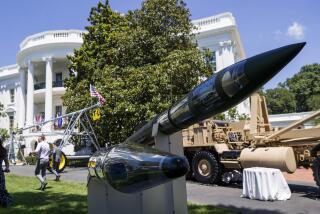Saudis OK U.S. Troop Relocation, Will Split Cost
- Share via
WASHINGTON — Saudi Arabia agreed Wednesday to let U.S. military officials relocate more than 4,000 American troops in that country in hopes of preventing more terrorist attacks, pledging to pay half the estimated $200-million cost.
The accord, announced jointly here and in the Saudi capital, Riyadh, followed two days of negotiations between Defense Secretary William J. Perry and top Saudi officials, including the country’s reigning monarch, King Fahd.
The announcement came as senior American officials disclosed that U.S. and allied intelligence agencies are searching for two trucks believed to be laden with explosives that reportedly have been dispatched to hit American targets in Saudi Arabia and Kuwait.
They said the reports about the trucks are the most tangible of a number of new threats over the last month that have put U.S. military personnel in Saudi Arabia on maximum alert and led to heightened precautions by about 35,000 American civilians living and working in the desert kingdom.
“There’s been a stream of threats and warnings,” one counter-terrorism official said. “It’s getting hard to keep up with them all. The picture changes almost daily.”
In response, the Central Intelligence Agency is making a major effort to identify potential terrorists and prevent further bombings. CIA officials are using satellite images and informants to locate the trucks, believed to have originated outside the Persian Gulf region, possibly in Lebanon’s Bekaa Valley, which has become a haven for many of the region’s most radical groups.
The emergency reshuffling comes a little more than a month after a 5,000-pound truck-bomb detonated near the perimeter of an air base near the eastern Saudi city of Dhahran. It blew up a building, killing 19 U.S. airmen and injuring hundreds more.
U.S. officials said the troop relocation, expected to begin in a few days, will involve shifting American air operations and personnel from Dhahran and Riyadh to a new, more remote Saudi air base at Al Kharj, about 60 miles southeast of Riyadh.
American-staffed Patriot missile batteries in Riyadh and Dhahran will remain there, but the U.S. personnel at Dhahran will move out of the Khobar Towers barracks compound, where the bombing occurred, and into housing inside the Al Kharj air base. U.S. service members in Riyadh will be consolidated into a compound outside the city.
A bombing in Riyadh on Nov. 13 killed five Americans and two Indians who were serving as advisors to the Saudi national guard. Four Saudis later were executed for carrying out the attack, prompting threats of retaliation by Islamic hard-liners.
The June 25 bombing at Dhahran sparked heightened concern by the Pentagon, where officials conceded that they had been unprepared for a device the size of the one detonated. The United States had stepped up security in Saudi Arabia after the November bombing.
Washington also has been complaining that the Saudis had been slow to cooperate after the November explosion in Riyadh, refusing to let FBI officials interview the four accused men before they were executed, blocking the U.S. agents from obtaining possible leads.
Only a few days ago, the State Department announced that it had authorized all dependents of diplomatic personnel in Saudi Arabia to travel back to the United States at government expense. Officials said the plan is to have them out of the region by mid-August.
Besides the threats involving the two bomb-laden trucks, U.S. officials also have received reports of suspicious people carrying out surveillance of U.S. military installations in Riyadh and trying to obtain information on other facilities in the country. Not all of those involved have been Saudis, or even Arabs, the officials said.
U.S. investigators also are pursuing the possibility that the Riyadh and Dhahran bombings were carried out by unrelated groups. While the Riyadh bombing was linked to Sunni extremists, they said the later attack at Dhahran may be the work of Shiite fanatics who live in the area.
If the attacks turn out to involve more than one terrorist group, it could imply wider dangers for American facilities, the officials said. It also would suggest that the dissident challenge to the Saudi royal family is more extensive than has been portrayed.
The troop-relocation pact announced Wednesday is part of a broader plan that Perry unveiled last month for improving security for U.S. troops stationed in trouble spots where American forces face threats by possible terrorists. He also has called for stepping up security for U.S. forces in Bosnia-Herzegovina and Turkey and for preparing existing forces to cope with possible threats of terrorist attacks involving chemical or biological weapons.
Moving U.S. air operations from Dhahran to Al Kharj is expected to be a major undertaking. Only recently completed, the Al Kharj facility still lacks sufficient infrastructure, such as headquarters buildings and barracks, as well as supplies and aircraft maintenance equipment.
More to Read
Sign up for Essential California
The most important California stories and recommendations in your inbox every morning.
You may occasionally receive promotional content from the Los Angeles Times.













